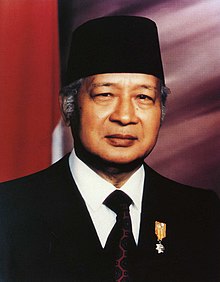Suharto, (8 June 1921 – 27 January 2008) was the second President of Indonesia, having held the office for 31 years from 1967 following Sukarno's removal until his resignation in 1998.
Suharto was born in a small village, Kemusuk, in the Godean area near Yogyakarta, during the Dutch colonial era. He grew up in humble circumstances. His Javanese Muslim parents divorced not long after his birth, and he was passed between foster parents for much of his childhood. During the Japanese occupation of Indonesia, Suharto served in Japanese-organised Indonesian security forces. Indonesia's independence struggle saw him joining the newly formed Indonesian army. Suharto rose to the rank of Major General following Indonesian independence. An attempted coup on 30 September 1965 was countered by Suharto-led troops and was blamed on the Indonesian Communist Party. The army subsequently led an anti-communist purge, and Suharto wrested power from Indonesia's founding president, Sukarno. He was appointed acting president in 1967 and President the following year. Support for Suharto's presidency was strong throughout the 1970s and 1980s but eroded following a severe financial crisis that led to widespread unrest and his resignation in May 1998. Suharto died in 2008.
The legacy of Suharto's 31-year rule is debated both in Indonesia and abroad. Under his "New Order" administration, Suharto constructed a strong, centralised and military-dominated government. An ability to maintain stability over a sprawling and diverse Indonesia and an avowedly anti-Communist stance won him the economic and diplomatic support of the West during the Cold War. For most of his presidency, Indonesia experienced significant economic growth and industrialisation, dramatically improving health, education and living standards.Indonesia's invasion and occupation of East Timor during Suharto's presidency resulted in at least 100,000 deaths. By the 1990s, the New Order's authoritarianism and widespread corruption were a source of discontent. In the years after his presidency, attempts to try him on charges of corruption and genocide failed because of his poor health and because of lack of support within Indonesia.
Suharto was born on 8 June 1921 during the Dutch East Indies era, in a plaited bamboo walled house in the hamlet of Kemusuk, a part of the larger village of Godean. The village is 15 kilometres (9.3 mi) west of Yogyakarta, the cultural heartland of the Javanese. Born to ethnic Javanese parents of peasant class, he was the only child of his father's second marriage. His father, Kertosudiro had two children from his previous marriage, and was a village irrigation official. His mother Sukirah, a local woman, was distantly related to Sultan Hamengkubuwono V by his first concubine.
 |
| Official Portrait of Suharto and First Lady Siti Hartinah. |
Five weeks after Suharto's birth, his mother suffered a nervous breakdown and he was placed in the care of his paternal great-aunt, Kromodiryo. Kertosudiro and Sukirah divorced early in Suharto's life and both later remarried. At the age of three, Suharto was returned to his mother who had remarried a local farmer whom Suharto helped in the rice paddies. In 1929, Suharto's father took him to live with his sister who was married to an agricultural supervisor, Prawirowihardjo, in the town of Wurjantoro in a poor and low-yield farming area near Wonogiri. Over the following two years, he was taken back to his mother in Kemusuk by his stepfather and then back again to Wurjantoro by his father.
Prawirowiharjo took to raising the boy as his own, which provided Suharto a father-figure and a stable home in Wuryantoro, from where he received much of his primary education. Suharto boarded with a dukun ("guru") of Javanese mystical arts and faith healing. The experience deeply affected him and later, as president, Suharto surrounded himself with powerful symbolic language. During this time, the Wonogiri area was one of the worst affected in Java from the collapse in the Dutch East Indies' export revenue during the Great Depression. As unemployed workers returned from the towns to their villages, the subsistence economy grew and the landless struggled to buy food.
The absence of official documentation and certain aspects of Suharto's early life that are inconsistent with that of a Javanese peasant (Suharto received, for example, an education fairly early on), has led to several rumours of Suharto being the illegitimate child of a well-off benefactor, which included being the child of a Yogyakarta aristocrat or a well-off Chinese Indonesian merchant.[14] Suharto biographer Robert E. Elson believes that such rumours cannot be entirely ruled out, given that much of the information Suharto has given on his origins has been tinged with political meaning.
Like many Javanese, Suharto had only one name. In religious contexts in recent years has sometimes been called “Haji” or “el-Haj Mohammed Suharto” but these names were not part of his formal name or generally used. The spelling "Suharto" reflects modern Indonesian spelling although the general approach in Indonesia is to rely on the spelling preferred by the person concerned. At the time of his birth, the standard transcription was "Soeharto" and he preferred the original spelling. The international English-language press generally uses the spelling 'Suharto' while the Indonesian government and media use 'Soeharto'.
Suharto's upbringing contrasts with that of leading Indonesian nationalists such as Sukarno in that he is believed to have had little interest in anti-colonialism, or political concerns beyond his immediate surroundings. Unlike Sukarno and his circle, Suharto did not learn to speak Dutch or other European languages in his youth. He learned to speak Dutch after his induction into the Dutch military in 1940.
Continue Read Part II



0 komentar:
Posting Komentar
Leave a comment